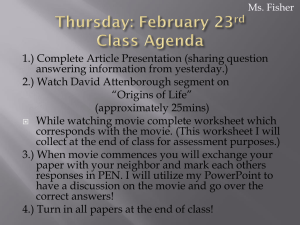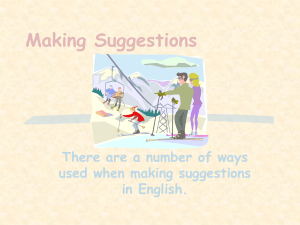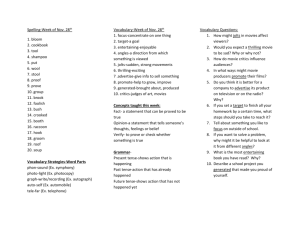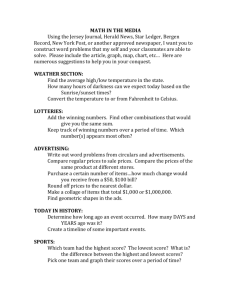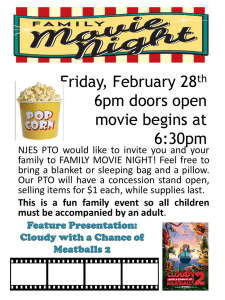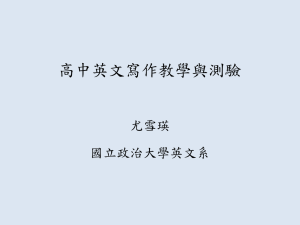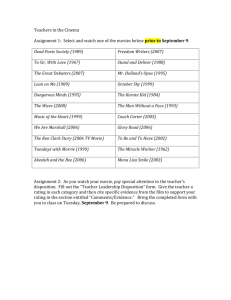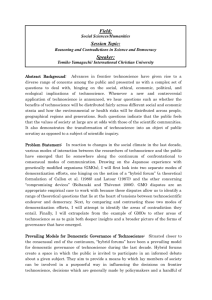Technoscience Culture - Hong Kong Shue Yan University
advertisement
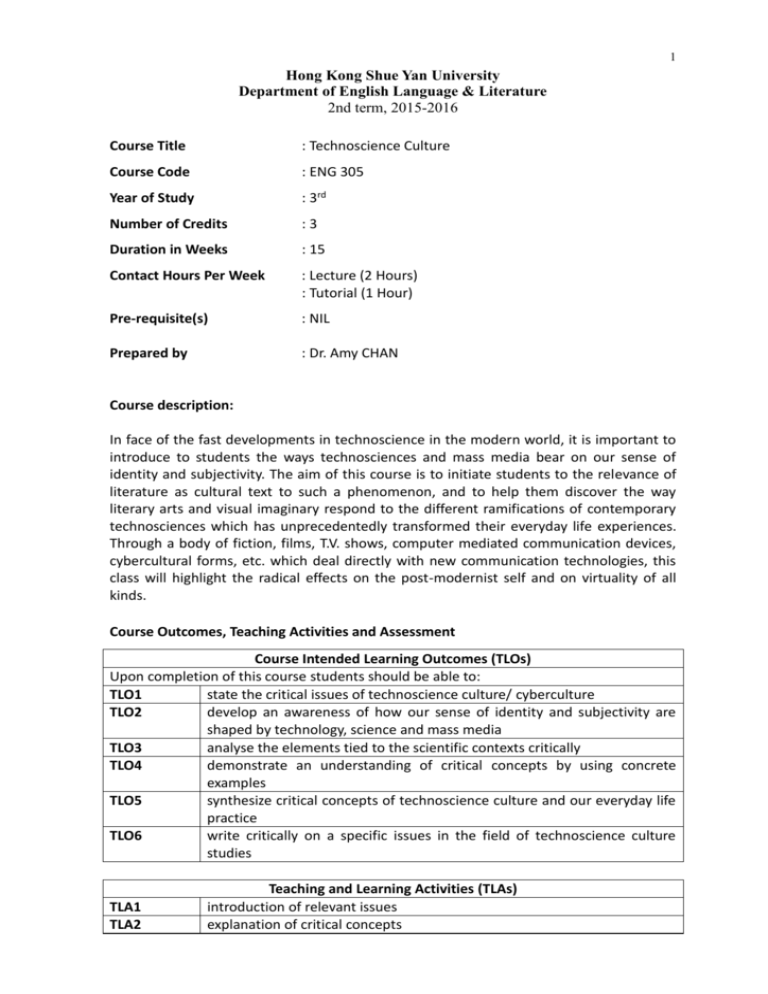
1 Hong Kong Shue Yan University Department of English Language & Literature 2nd term, 2015-2016 Course Title : Technoscience Culture Course Code : ENG 305 Year of Study : 3rd Number of Credits :3 Duration in Weeks : 15 Contact Hours Per Week : Lecture (2 Hours) : Tutorial (1 Hour) Pre-requisite(s) : NIL Prepared by : Dr. Amy CHAN Course description: In face of the fast developments in technoscience in the modern world, it is important to introduce to students the ways technosciences and mass media bear on our sense of identity and subjectivity. The aim of this course is to initiate students to the relevance of literature as cultural text to such a phenomenon, and to help them discover the way literary arts and visual imaginary respond to the different ramifications of contemporary technosciences which has unprecedentedly transformed their everyday life experiences. Through a body of fiction, films, T.V. shows, computer mediated communication devices, cybercultural forms, etc. which deal directly with new communication technologies, this class will highlight the radical effects on the post-modernist self and on virtuality of all kinds. Course Outcomes, Teaching Activities and Assessment Course Intended Learning Outcomes (TLOs) Upon completion of this course students should be able to: TLO1 state the critical issues of technoscience culture/ cyberculture TLO2 develop an awareness of how our sense of identity and subjectivity are shaped by technology, science and mass media TLO3 analyse the elements tied to the scientific contexts critically TLO4 demonstrate an understanding of critical concepts by using concrete examples TLO5 synthesize critical concepts of technoscience culture and our everyday life practice TLO6 write critically on a specific issues in the field of technoscience culture studies TLA1 TLA2 Teaching and Learning Activities (TLAs) introduction of relevant issues explanation of critical concepts 2 TLA3 illustration of critical concepts and issues with daily examples and multimedia materials critical reading of the cultural texts with relation to the key concepts explanation of required readings in-class discussions online discussion on specific topics oral presentations by students peer comment on presentation and discussion writing of term paper TLA4 TLA5 TLA6 TLA7 TLA8 TLA9 TLA10 AT1 AT2 AT3 AT4 Assessment Tasks (ATs) Participation in Class discussion Oral Presentation Term Paper Final Examination 10% 20% 30% 40% TOTAL 100% Alignment of Course Intended Learning Outcomes, Teaching and Learning Activities and Assessment Tasks Course Intended Learning Teaching and Learning Assessment Tasks Outcomes Activities TLO1 TLA1,4,5,6,7 AT1,2 TLO2 TLA1,2,3,4,6,7 AT1,2,3 TLO3 TLA2,3,4,6,8,10 AT1,3,4 TLO4 TLA3,4,7,8,10 AT2,3,4 TLO5 TLA8,10 AT1,2,3,4 TLO6 TLA7,10 AT3,4 Course Outline Week 1 Introduction: Science, Technology….and Culture? David Bell. (2006) Science, Technology and Culture. Berkshire: Open University Press. pp. 1-16. Reference: Metropolis (movie), Modern Times (movie) Week 2 Technologies and Humanity Mary Shelley’s Frankenstein (movie) Keywords: Frankenstein syndrome, Reproductive technologies, Question of human Reference: Andrew Murphie and John Potts. (2003) Culture & Technology. New York: Palgrave. pp. 11-35. Week 3 Post-information Age Jeff Lewis. (2002) “The Culture of New Communications Technology,” Cultural Studies: The Basics. pp. 379-418. Jenkins, Henry. (2009) “Buying into American Idol: How We Are Being Sold on Reality 3 Television.” Reality TV: Remaking Television Culture. Eds. Susan Murray and Laurie Ouellette. New York: New York University Press. pp. 343-362.Robert Sheckley, “The Life of Anybody” Reference: The Net (movie), S1M0ne (movie) and Truman Show (movie) Week 4 Cyberspace and Virtual Reality Benedikt, Michael. (2000) “Cyberspace: First Steps.” Cybercultures Reader. Ed. David Bell. London: Routledge. pp.29-44. Turkle, Sherry. (2002) "Constructions and Reconstructions of the Self in Virtual Reality." Cyber_Reader: Critical writings for the Digital Era. Ed. Neil Spitler. London: Phaidon. pp. 208-215. Philip K. Dick, “We Can Remember it for You Wholesale” Reference: The Matrix trilogy (movie), The Lawnmower Man (movie) Week 5 Posthumanism and Postmodern Landscapes Blade Runner, The Final Cut (movie) 117 mins Keywords: Posthuman, Postmodern urbanscape, Artificial intelligence Week 6 Posthuman and Cyberbodies Nayar, Pramod K. (2014) “The Body, Reformatted.” Posthumanism. Cambridge: Polity. pp. 55-76. Gray, Chris Hables. (2001) “The Cyborg Body Politic.” Cyborg Citizen: Politics in the Posthuman Age. New York & London: Routledge. pp. 9-20. Reference: A.I.: Artificial Intelligence (movie), RoboCop (movie), Terminator (movie), Ex Machina (movie) Week 7 Technoscience and Gender Evelyn Fox Keller. (2001) "Gender and Science: An Update." A Reader in Feminist Science Studies: Women, Science, and Technology. Eds. Mary Wyer et al. New York: Routledge. pp.132-142. Reference: Avalon (movie) Week 8 Reading Week Week 9 Cyberfeminism Ghost in the Shell (movie) 82 mins Keywords: Cyberfeminism, Artificial Intelligence, Body and consciousness Haraway, Donna. (1991) “A Cyborg Manifesto: Science, Technology, and Socialist-Feminism in the Late Twentieth Century.” Simians, Cyborgs, and Women: The Reinvention of Nature. London: Routledge. pp. 149-181. 4 Week 10 Genetic Engineering Matt Ridley, Nature Via Nurture: Genes, Experience and What Makes Us Human, 2004, pp. 201-248; 305-309 Greg Egan, “Bridgers” Reference: Gattaca (movie), 6th Day (movie), The Island (movie), Surrogate (movie) Week 11 Digital Game Culture Lahti, Martti. (2003). “As We Become Machines: Corporealized Pleasures in Video Games.” The Video Game Theory Reader. Eds. Mark J.P. Wolf & Bernard Perron. London & New York: Routledge. pp. 157-170. Zimmerman, Eric. (2008). “Game Literacy: Game Design as a Model for Literacy in the Twenty-First Century.” The Video Game Theory Reader 2. London & New York: Routledge . pp. 23-32. Reference: eXistenZ (movie), Nirvana (movie) Week 12 Technoscience and Religion Contact (movie) 153 mins Keywords: Science, religion and faith, SETI, Origin of human Week 13 Technoscience and Cultural Reenchantment Laszlo, Ervin. “The Amazing Coherence of (Nearly) Everything.” Science and the Reenchantment of the Cosmos: The Rise of the Integral Vision of Reality. Rochester: Inner Traditions, 2006. pp. 6-22. Reference: film clips from Deep Blue, Blue Planet, and Abyss Week 14 Recapitulation Week 15 Reading Week Academic Honesty You are expected to do your own work. Dishonesty in fulfilling any assignment undermines the learning process and the integrity of your college degree. Engaging in dishonest or unethical behavior is forbidden and will result in disciplinary action, specifically a failing grade on the assignment with no opportunity for resubmission. A second infraction will result in an F for the course and a report to College officials. Examples of prohibited behavior are: Cheating – an act of deception by which a student misleadingly demonstrates that s/he has mastered information on an academic exercise. Examples include: Copying or allowing another to copy a test, quiz, paper, or project Submitting a paper or major portions of a paper that has been previously submitted for another class without permission of the current instructor Turning in written assignments that are not your own work (including homework) Plagiarism – the act of representing the work of another as one’s own without giving credit. Failing to give credit for ideas and material taken from others Representing another’s artistic or scholarly work as one’s own Fabrication – the intentional use of invented information or the falsification of research or other findings with the intent to deceive To comply with the University’s policy, the term paper has to be submitted to VeriGuide. 5 Reference: Aronowitz, Stanley et al, eds. (1996) Technoscience and Cyberculture. New York and London: Routledge. Balsamo, Anne. (1996) Technologies of the Gendered Body: Reading Cyborg Women. Ed. Anne Balsamo. Durham and London: Duke University Press. Bell, David & Kennedy, Barbara M., eds. (2000) The Cybercultures Reader. London & New York: Routledge. Bell, David. (2006) Science, Technology and Culture. Berkshire: Open University Press. Bennett, Jane. (2001) The Enchantment of Modern Life: Attachments, Crossings, and Ethics. Princeton and Oxford: Princeton University Press. Bukatman, Scott. (1993) Terminal Identity: The Virtual Subject in Postmodern Science Fiction. Durham & London: Duke University Press. Feenberg, Andrew.(1999). Questioning Technology. London and New York: Routldege. Gornick, Vivian. (2009) Women in Science: Then and Now. New York: The Feminist Press. Gray, Chris Hables, ed. (1995). The Cyborg Handbook. New York & London: Routledge. Hayles, Katherine N., ed. (1991). Chaos and Order: Complex Dynamics in Literature and Science. Chicago and London: The University of Chicago Press. Hayles, N. Katherine. (1999) How We Became Posthuman Virtual Bodies in Cybernetics, Literature, and Informatics. New York: University of Chicago Press, 1999. Kellner, Douglas. (1995). Media Culture: Cultural studies, identity and politics between the modern and the postmodern. London and New York: Routledge. Kirkup, Gill et al, eds. (2000) The Gendered Cyborg: A Reader. London & New York: Routledge. Laszlo, Ervin. (2006) Science and the Reenchantment of the Cosmos: The Rise of the Integral Vision of Reality. Rochester: Inner Traditions. -----. (2007) Science and the Akashic Field: An Integral Theory of Everything. Rochester: Inner Traditions. -----. (2008) Quantum Shift in the Global Brain: How the New Scientific Reality Can Change Us and Our World. Rochester: Inner Traditions. Murphie, Andrew & Potts, John. (2003). Culture & Technology. Hampshire: Palgrave. Poster, Mark. (1995). The Second Media Age. Cambridge: Polity. Schuler, Douglas et al, eds. (2003) Cyberculture: The Key Concepts. London & New York: Routledge. Spiller, Neil, ed. (2002) Cyber_Reader: Critical Writings for the Digital Era. New York: Phaidon.
